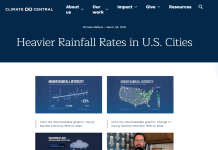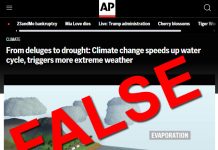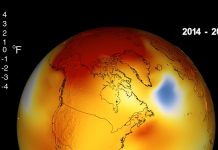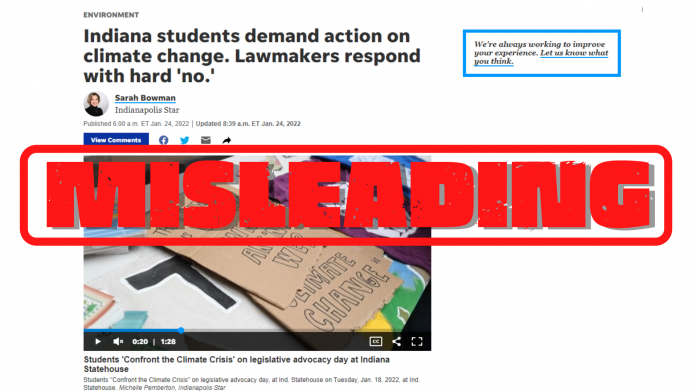Near the top of the story listings of a Google News search of the term “climate change” today is an article from the Indianapolis Star, titled “Indiana students demand action on climate change. Lawmakers respond with hard ‘no.’” The story’s author, Sarah Bowman, sides with ill-informed, frightened Indiana school kids against educated legislators, concerning the need for state action to fight climate change. Bowman writes:
“It’s obvious to a lot of people. To the Indiana cities that are taking steps to cut their emissions. To the Hoosier farmers who are seeing reduced crop yields from wetter springs and hotter summers. To the high school students who are scared for what their future may look like, demanding Indiana leaders make a change.
And yet, the state legislature seems to have blinders on when it comes to climate change, according to environmental experts and advocates.”
What may be obvious to legislators, though evidently not to Bowman or many of Indiana youths, is that climate disaster claims lack any basis in real-world data.
What Bowman and the youths are objecting to is, with the deadline for introducing new bills this session waning, Indiana’s legislators have not scheduled the three climate change related bills for committee hearings. The bills were developed and pushed by a student group called Confront the Climate Crisis.
One bill, introduced in both houses of the legislature but not scheduled for hearings in either, would establish a bipartisan commission or task force with experts to make recommendations on steps Indiana can take to address climate change. Another offering being ignored by Indiana’s legislators is Senate Concurrent Resolution 3, which recognizes climate change and says “all Hoosiers, particularly those most vulnerable to changes in Indiana’s climate, must be protected through adaptive climate solutions.”
As Climate at a Glance: U.S. Temperatures explains, according to the National Oceanic and Atmospheric Administration’s (NOAA) highly accurate U.S. Climate Reference Network, the United States has experienced no significant warming since at least 2005. Also, contrary to the temperature claims made in the story, as the graphic below from NOAA demonstrates, Indiana is among the states that has experienced among the largest overall decrease in average temperatures over the past 30 years.
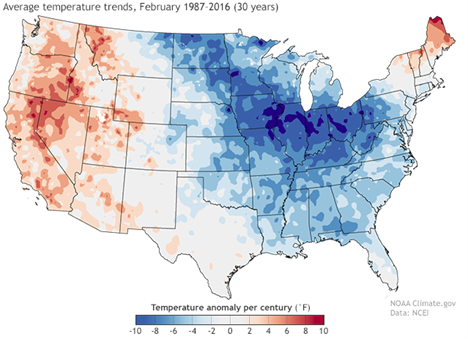
Bowman’s warning that an increase of winter and spring precipitation in Indiana poses a threat of more severe and more common floods, is refuted by The U.N. Intergovernmental Panel on Climate Change (IPCC). In its 2018 interim report the IPCC concluded it had “low confidence” in any climate change impact regarding the frequency or severity of floods. Going further the IPCC admitted having “low confidence” in even the “sign” of any changes—in other words, it is just as likely that climate change is making floods less frequent and less severe.
In its Sixth Assessment Report (AR6), released on August 9, 2021, the IPCC goes farther making it clear increased rainfall does not necessarily and has not thus far translated into increased flooding. Although the IPCC’s AR6 concludes “the frequency and intensity of heavy precipitation have likely increased at the global scale over a majority of land regions with good observational coverage,” it explicitly states “heavier rainfall does not always lead to greater flooding.” Regarding flooding, the AR6 says, “Confidence about peak flow trends over past decades on the global scale is low, … [and] there is low confidence in the human influence on the changes in high river flows on the global scale.”
The warning the Indianapolis Star issued concerning the harm to agriculture from climate change is equally unmerited. Reports from the National Agricultural Statistics Service, a department of the United States Department of Agriculture (USDA), assembled with the cooperation of the Indiana’s USDA field office show, rather than seeing reduced yields due to climate change, as explicitly claimed by the Indianapolis Star, crop yields have significantly increased during the past 20 years of modest warming.
In August 2021, the USDA reported that Indiana was on pace to set crop yield records for corn, soybeans, and winter wheat. The USDA’s projections proved accurate. Indiana’s farmers produced record yields for those crops and other important agricultural crops and products as well. Historical data show, that despite yearly ups and downs, between 2000 and 2021:
- Indiana’s corn yields increased by more than 27 percent.
- Indiana’s soybean yields increased by more than 28 percent.
- Indiana’s winter wheat yields grew by approximately 1.4 percent.
As is true around the globe, far from harming farm production in Indiana, global warming has lengthened growing seasons, reduced frost events, and made more land suitable for crop production. This fact was examined in detail by the Non-Governmental International Panel on Climate Change in its volume, Climate Change Reconsidered II: Biological Impacts.
Also, carbon dioxide is an aerial fertilizer for plant life. In addition, crops also use water more efficiently under conditions of higher carbon dioxide, losing less water to transpiration. The benefits of more atmospheric carbon dioxide and a modestly warming world have resulted in 17 percent more food being available per person today there was 30 years ago, even as the number of people has grown by billions. Indeed, the last 20 years have seen the largest decline in hunger, malnutrition, and starvation in human history.
If they weren’t advocating public policies which would restrict peoples’ free choices concerning how to live, Indiana’s youths could almost be excused for not knowing these facts about climate change and its measured impact in Indiana. They have been, after all, indoctrinated into climate alarm by a constant drum beat of climate misinformation in their schools, by the corporate media, and on popular social media platforms. Bowman, as a journalist, has no such excuse. She, and the paper she writes for, should check the facts before running a story hyping unwarranted fears. The fact is climate change does not threaten the future survival of youths, adults, or anyone else in Indiana. Also there is no evidence it is making weather in Indiana more severe or making it harder for farmers to flourish in the state.



